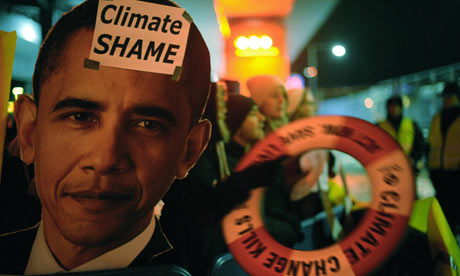In the end, Copenhagen ended as Obama’s current approval rate:
disappointing. The UN summit had from the beginning the same problem as the American President; too many expectations were lying on it to be accomplished. Some even copied Obama’s claim, from Copenhagen to
Hopenhagen. But trying to achieve a global goal, with a global agreement, that has been delayed for ten years, in just a week; looked like a
hopeless mission.
But yet some have extracted a few valuable lessons from the meeting. According to the
Economist, ten years ago, in Kyoto, it was difficult even bring the developing countries to the table in order to talk. This time, they have been talking since the beginning. However, the main problem continues there (and will be there
for long). The developing countries’ leaders -China and India- had led the ‘No’ group. In fact, many analysts blame China for the huge failure of Copenhagen.
According to a report from
Mark Lynas, a freelance journalist present in Copenhagen, China “not only rejected targets for itself, but also refused to allow any other country to take on binding targets”. By
putting pressure on Asian and African countries that depend on their trade with China, they blocked the deal. It’s the first punch of a new superpower, without military bases or the need to invade foreign countries.
Truth is, Africa and Asia didn’t need too much encouragement either to commit to China’s goal. Besides from the fact of the trade-related pressure from China, in Copenhagen, the main fight came from the demand of the developed countries -specially the Umbrella group- to the developed countries to commit themselves too to cut the carbon emissions. Meanwhile, the developing countries insist that much of the problem was caused by the developed countries, and they cannot sacrifice their technological growth just now. Or at least, not for free.
This might have had a reasonable point in 1990, when their emissions were half of the developed world. And it still might work for many African and Asian nations. But right now, China is the first polluter of the world and between them and the Indians, almost equalize the total carbon emissions of the developed world. It doesn’t matter now who polluted more in the past; what matters now is to stop polluting. All of us.
The problem for China is that, if they want to become a real superpower as the USA is today, they need that CO2 in the air. China's growth, and growing global political and economic dominance, is based largely on cheap coal. Their strategy is a long shot. They have the advantage of not having the NGOs and the ecologist groups putting pressure on them -it always goes to the US and the EU. Not even internally will have problems: they don’t respond before a strong public opinion nor they have to be elected every four years.

Photo: Olivier Morin/AFP/Getty Images.
Activists demonstrate outside the Bella Center in Copenhagen at the end of the COP15 UN Climate Change Conference.
Did you like it? Share it








 1/05/2010
1/05/2010
 Ehiztari
Ehiztari



 Twitter
Twitter Facebook
Facebook Flickr
Flickr


